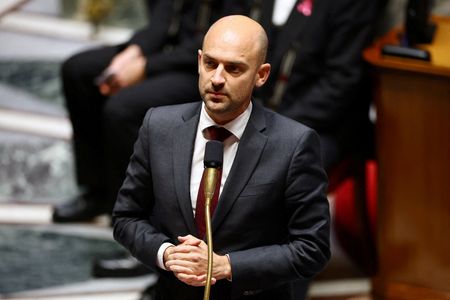By STAMOS PROUSALIS and Alkis Konstantinidis
ATHENS (Reuters) – Greeks bid farewell on Thursday to former prime minister Costas Simitis, a law professor and reformist, who died last week at the age of 88 and was praised for steering Greece into the European Union’s single currency in 2001.
Traffic halted as the hearse drove through central Athens and thousands of people gathered outside the Metropolitan Cathedral for the funeral service of Simitis, who was prime minister from 1996 to 2004 as the leader of the once powerful PASOK socialist party.
State officials, politicians, academics and Cyprus’ President Nikos Christodoulides were those gathered at the Athens Cathedral for the funeral, following four days of national mourning.
Under Simitis’ leadership, Greece cut down on public debt and government spending to qualify for the euro zone, invested heavily in public infrastructure and successfully bid to host the 2004 Olympics in Athens.
He also facilitated Cyprus, a historical ally of Greece, to join the European Union in 2004.
“Boldly, he set the bar high and served the vision of a strong and equitable Greece in Europe,” Greek President Katerina Sakellaropoulou said in a eulogy, standing in front of Simitis’ coffin which was draped with a Greek flag.
“His modernisation policy was not just a political platform of the time but a continuous institutional and social exercise, a constant challenge to reform until today.”
The public broadcaster showed images of a large crowd led by Sakellaropoulou and senior PASOK party officials escorting the hearse on foot from the Cathedral to an Athens cemetery, a 30-minute walk.
“He was an invaluable and honourable prime minister,” local resident Asiliki Provi, 76, told Reuters.
However, Simitis’ tenure was not without controversy. Five years after he left power, Greece fell into an unprecedented, decade-long debt crisis, which nearly saw the country exit the euro zone and forced it to sign up to international bailouts worth 290 billion euros ($299 billion) which entailed painful austerity.
Economists traced back the roots of the financial meltdown to graft and corruption during Simitis’ government and earlier and some questioned his handling of Greece’s joining the euro zone.
($1 = 0.9708 euros)
(Reporting by Stamos Prousalis and Alkis Konstantinidis; Writing by Angeliki Koutantou, editing by Emelia Sithole-Matarise)














